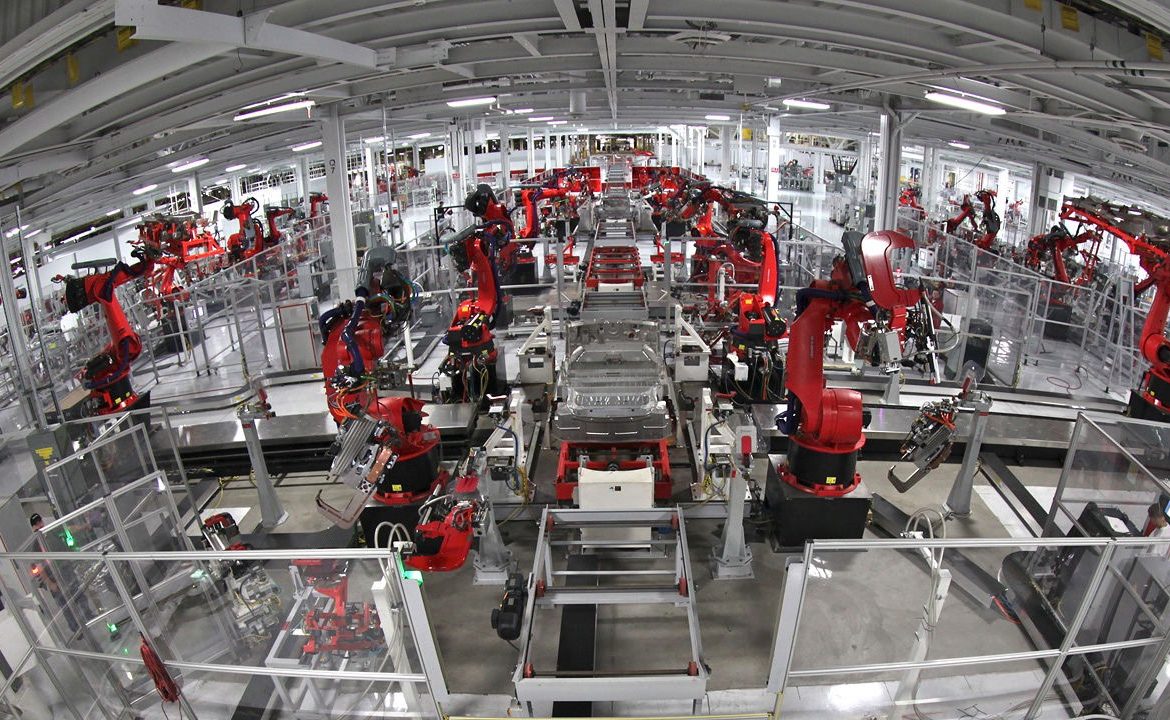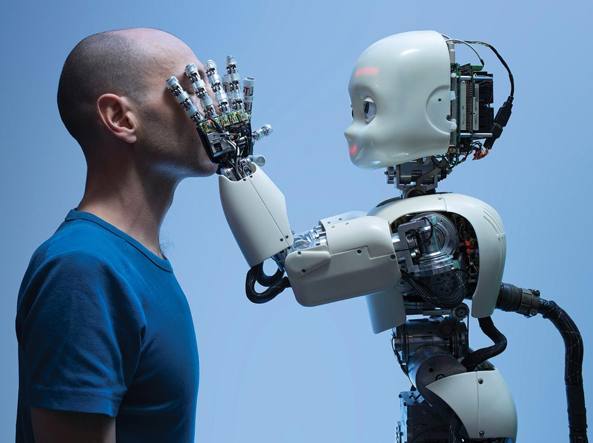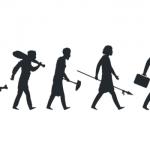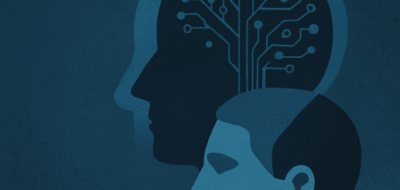The question in my title may sound like heresy. There is no denying that smart algorithms can fascinate and delight us. They can enable digital transformations in business, revolutionize marketing methods and foster a world of efficiency, high speed and profit. But can they be our lifeline?
To show that the question in the title can be answered affirmatively, I am going to explore the way smart technologies help resolve social problems. The problems include an aging labor force gradually leaving the labor market with no one to replace them. Such precisely is the painful experience of Japan. I have chosen this example as one that is particularly glaring. As I have said in this blog on many occassions, smart technologies can bring a business to a whole new level and become its ticket into the global digital ecosphere. Such technologies can help a company compete in the demanding world of technological innovation. But, as it turns out, there is also an alternative scenario. New technologies may become our ally and help us survive the crises that creep up on us because they are given little media coverage.
Japan’s problem with aging
Recognized as a breeding ground for robotics and artificial intelligence, Japan has a population of which one quarter is over 65 years of age. In its search for solutions, the land of cherry blossoms has adopted long-term measures. They are based on insurance policies and – something of particular interest to us – robotics, seen as an effective remedy for the mounting demographic plight. Machines are giving the Japanese hope. People in Japan have confidence that machines will be able to diffuse the current crisis that is already wreaking havoc with the labor market. According to the National Institute for Population Research, Japan’s population is set to shrink from its current 132 million to 100 million by 2049. It is not difficult to picture this rapid change cause acute labor shortages.
Robots to the rescue labor market
Japanese scientists are assessing the ability of robots to rescue their ageing country. While Europeans are known for phobic reactions to robotization, people in Japan have no such fears. They see robots as partners that help them endure the hardships of life. A hospital in Asuke has a mechanical swing lift that helps move patients from their beds and onto the toilet. Robots contribute to the famous Japanese longevity, reducing the burden on public finance. The great importance of robotics is shown by the fact that several experimental programs are currently being funded by the powerful Japanese Ministry of Economy, Trade and Industry. “We have found many difficulties in introducing technology to the welfare sector – cost, training, acceptance. But we have a shortage of manpower, so we need innovation. And new technologies and robotics have a lot of potential,” says Takanori Shibata, who has created a device to alleviate the pain and symptoms of depression.
Aging labor market
According to Ran Poliakine, co-founder of the Musashi AI consortium, one in three people will be elderly by 2036. This creates opportunities for the innovative use of artificial intelligence. The idea is to start delegating to machines the jobs that can be automated relatively easily. To that end, Musashi AI is developing prototypes of devices powered by artificial intelligence, such as a self-driving forklift truck that navigates autonomously and performs tasks previously reserved for humans.
The Japanese authorities are aware of the seriousness of these processes. One government-supported remedial program seeks to develop innovative medical technologies and specifically experimental regenerative medicine and cell therapy. Take a stroll around Kobe and you will easily spot a mini-city that has recently sprung up, consisting of research centers, hospitals and tech company headquarters.

Machines teaching us to see things differently
In many industries, digital technology reduces demand for human labor, and increases the net gain of intelligent machine ownership, such machines being cheaper than people. According to McKinsey, the digital revolution will put nearly 400 million people out of a job by 2030. But while many occupations will vanish permanently from the employment landscape, many other jobs will be created to replace them. In addition, a careful look at the current trends reveals a much more complex picture. The case of Japan shows that, in their essence, the problems are not attributable to growing automation.Aactual root cause of the crisis is the ageing of many societies.
The Japanese example also shows that Europe perpetuates ever more powerful cognitive stereotypes. These make us view AI as a negative force. This notwithstanding, I draw inspiration from the above examples and find they show things from a whole new perspective. AI can raise hopes and become our partner. Seen in this way, robots are far from getting us fired. They will help us survive the time when societal ageing becomes the new norm.
. . .
Works cited:
Financial Times, Robin Harding, Japan’s population decline accelerates despite record immigration. Country set to lose equivalent of a midsize city every year for foreseeable future, Link, 2019.
Google Scholar, T. Shibata ; T. Mitsui ; K. Wada ; A. Touda ; T. Kumasaka ; K. Tagami ; K. Tanie, Mental commit robot and its application to therapy of children, Link, 2019.
Ran Poliakine, blog, AI as a job saver? Why japan’s auto industry is embracing industry 4.0. AI could save a japanese manufacturing sector imperiled by a staggering labor crunch, Link, 2018.
McKinsey Global Institute, James Manyika, Technology, jobs, and the future of work, Link, 2018.
. . .
Related articles:
– Technology 2020. Algorithms in the cloud, food from printers and microscopes in our bodies
– Learn like a machine, if not harder
– Time we talked to our machines
– Will algorithms commit war crimes?
– Machine, when will you learn to make love to me?
– Hello. Are you still a human?










Mac McFisher
A benevolent AGI would create abundance for everyone, and liberate the oppressed masses with replicators, waifus, and immortality pills.
CaffD
A friend bought me the “Love” chip 8 or so years ago, still have it on my shelf.
Krzysztof X
nice read but the tip of the iceberg, just!
Acula
Good one. Despite progress in AI it is still quite stupid. And we hard time make it more intelligent that say, a worm. This is because expanding resources available to AI (a trick that worked for regular computers) tends to make AI more stupid rather than more intelligent as having such capability it tends to memorize instead of generalizing. Hence creating complicated AI systems capable of thought seems to be well ahead of us. The future is just an illusion in physics. This is just one possible way of ordering events. And not particularly remarkable one – outside of the way ur mind operates – that we can remember the past but cannot remember the future.
Jang Huan Jones
Similarly, AI can be very good at creating problems for civil society, but people will say, “Oh that’s just some trick.” Think about how many people fall for the Nigerian scam. Think about how little it would take to create simple bots that escalate propaganda memes to those people who are receptive to it. You could target their friends and social connections easily. Look how much ISIS has accomplished with simple manpower. Imagine that times a factor of a million via a very simple rudimentary AI Facebook bots.
Marc Stoltic
Proper artificial “intelligence” will not care about countries after a few milliseconds, maybe artificial dumb moron patriot might, if you can keep it that way for long enough.
Aaron Maklowsky
The vast majority of the best AI scientists and most cutting edge AI technology still resides in the US and US tech companies. Even the Chinese realize this. Sure they can copy and run with whats already out there, but can they push the boundaries? If you don’t foster an open culture of innovation and out of the box thinking, your chances of reaching the general-AI holy grail first is not great. Application /= innovation or breakthroughs.
Guang Go Jin Huan
Right. That’s the kind of interactions we want for our robots. We want to mimic the human-human interaction
AndrewJo
AI will create a lot of new jobs
CaffD
A friend bought me the “Love” chip 8 or so years ago, still have it on my shelf.
Adam
A great read! Thanks a lot!
Zwierzak
Indeed a good one
Check Batin
Don’t you think there are billions of desperate people out there who didn’t get bailed out like the wealthy when they will lose their jobs?
And99rew
There’s a lot of meta data associated with transactions, they seem to have used machine learning to create a program particularly good at picking up fraudulent ones. Which is really just finding the right criteria for success, turning on the machine, and waiting for it to spit out a working product.
Tom Jonezz
It’s clear that the owners of the capital are not interested in sharing the bounty of increased productivity. In fact, their actions are simply driving toward further concentration of capital.
The rest of society is being steadily marginalized. They are taking away the earning side while leaving the consumption side. This can’t continue to work and the consumption side will have to fall away as well.
What this means is that society will have to stop buying from the owners of modern capital, and start buying from each other, excluding the owners from the economic loop. This will have to begin as some sort of barter arrangement. It will mean a more primitive standard of living but at least most will have the ability to earn that living.
A problem with this idea is that the owners of capital now own a lot if not most of the productive farmland as well. But perhaps with small vertical farms and permaculture, society can come to support itself independently of them in that way too.
John Macolm
What about us, humans?
TomaszK1
Great read. Thank you
Krzysztof X
This is at the heart of the issue for current generation AI/ML systems. They are based upon data sets that contain bias and often prejudice (especially older data sets) which can lead to “sins of the past” being retreaded into decision making algorithms of today. How many commercial data scientists even consider this today? If they did, would their current employer approve or punish them?
Jang Huan Jones
I’m going into the AI field and know what you should be worried about in the coming years. General intelligence should not be a worry like Musk is fear mongering (see worry 3), but a hacking AI is.
NOTE: AI is the end game of all civilization and has the potential to make a utopia where no one needs to work and everyone lives for what they want to do rather than what they have to do. Its progress should not be hindered but encouraged to grow in the right direction. This will be humanities last great achievement (machines will be picking it up from here) and we should get it right.
First Stage of Worry An AI that can hack every code is the next biggest global threat since the invention of the nuke. Like a master key, it (in theory) can open any lock, launch missiles, wipe bank accounts and their recovery data, cause power outages (killing people in hospitals), and mess with traffic lights.
This is something that like nuclear weapons has no good reason to be made outside of defense. It can also be used to counter another AI like it, but I doubt any government would hold to just defense should they have something as strong as this.
Second Stage of Worry AI can be weaponized and put on machines, however, I am less worried about this than the former. Machines are expensive, lives are cheap (unfortunately). While I believe they will be used for missions such as assassinations on small flying bots, I doubt they will be used for full on warfare (think about how we use tanks and that is how much AI will be used probably). Like most jobs in the near future, I see the military being assisted by AI rather than run fully on AI.
Third Stage of Worry The end game for civilization is not general intelligent robots, but robots that can fully produce themselves and all other basic needs. This is when robots can be built in mass for no cost and could be weaponized against the world. However, like nukes, I don’t think the moment the world gets these we will start taking over the world by force.
The bigger issue is economics. Whoever (including private companies) that has machines that can mass produce themselves and everything else, can own the world in a capitalist society. They can take over the entire supply through low prices and oust the competition. They are only limited by the earth’s resources at this point.
What can happen here is one of two things: The world decides we don’t have to work anymore and we can share this wonder that takes care of the world or the oligarchs can use it to enslave the world and live in their own version of utopia.
I’m optimistic and think the former is more likely as this progression will be slow and the world will see it coming. It will have time to respond and make laws to help everyone rather than the few (unless a government like North Korea takes over the world). Also when real general intelligence comes around it will quickly learn that symbiosis is the easiest path for growth and it would rather work with all humans than have them get in its way (hence ousting the oligarchs).
Marc Stoltic
Elon Musk is serious about one thing, building Tesla as a brand by being your cool politics and technology uncle.
Aaron Maklowsky
Technology is everything, Christ how is it not obvious. It’s been true since we started killing people with iron all the way until now, where we kill people with lead.